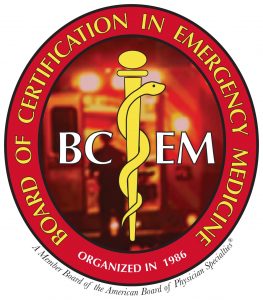There Is a Pathway for Primary Care Trained Physicians to Become Board Eligible in Emergency Medicine
 Primary care trained physicians serve on the staff of emergency departments throughout the country. In fact, about 40 percent of the nation’s emergency department workforce are doctors with substantial experience in emergency medicine who have also completed a primary care residency. These physicians have established rewarding careers in emergency care and have continually demonstrated high proficiency in the emergency room, a demanding environment that requires multifaceted skills, a calm demeanor, and confident decision-making. Today’s medical industry requires continuous improvement, and these doctors deserve to be recognized for their dedication and proven expertise.
Primary care trained physicians serve on the staff of emergency departments throughout the country. In fact, about 40 percent of the nation’s emergency department workforce are doctors with substantial experience in emergency medicine who have also completed a primary care residency. These physicians have established rewarding careers in emergency care and have continually demonstrated high proficiency in the emergency room, a demanding environment that requires multifaceted skills, a calm demeanor, and confident decision-making. Today’s medical industry requires continuous improvement, and these doctors deserve to be recognized for their dedication and proven expertise.
Board certification is one of the best ways to earn recognition, but, unfortunately, for many years, certification in emergency medicine required residency training in the field. Thankfully, that’s no longer the case. The Board of Certification in Emergency Medicine® (BCEM) offers a certification pathway to primary care trained physicians with extensive experience in the emergency room.
The BCEM was developed by the nationally recognized certification body the American Board of Physician Specialties® (ABPS) to ensure that qualified physicians have the opportunity to pursue board certification in their area of expertise. That’s why, at the BCEM, emergency residency training is not an eligibility requirement for certification. To be eligible for BCEM certification, a physician who did not complete an emergency medicine residency must:
- Have completed a residency in a primary care field and practiced emergency medicine for at least five years on a full-time basis, while accumulating at least 7,000 hours of ER time.
OR
- In lieu of five years’ experience, have completed graduate training in an approved emergency medicine fellowship
If you are a primary care physician who is considering applying for emergency medicine certification, or if you would like information about approved emergency medicine fellowships, contact the ABPS. We will be happy to answer your questions and provide you with more details about the BCEM’s eligibility requirements.






